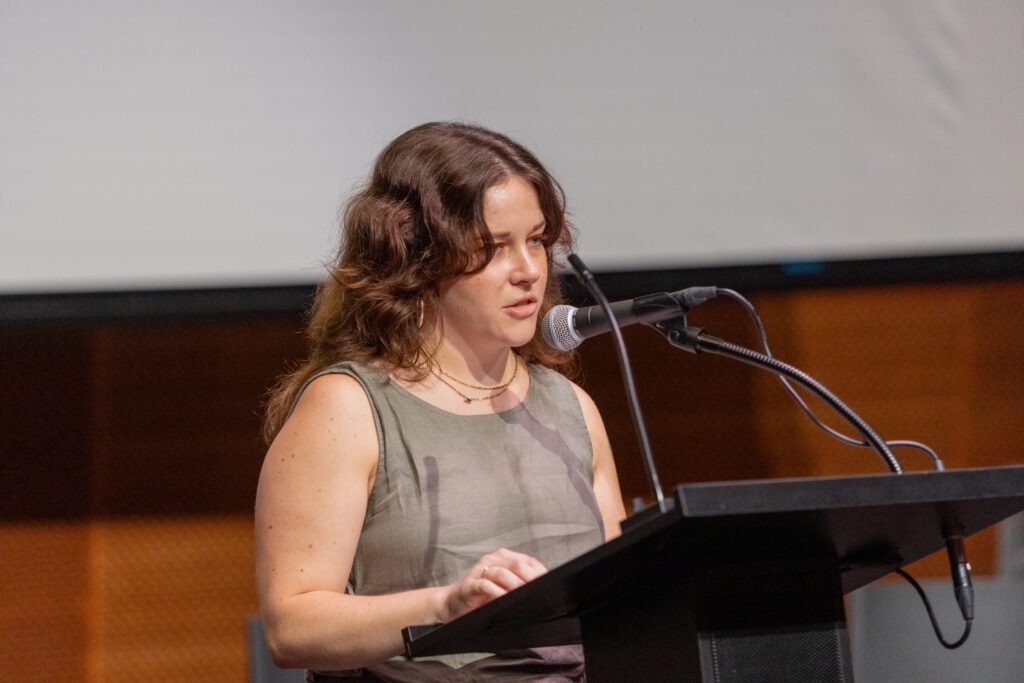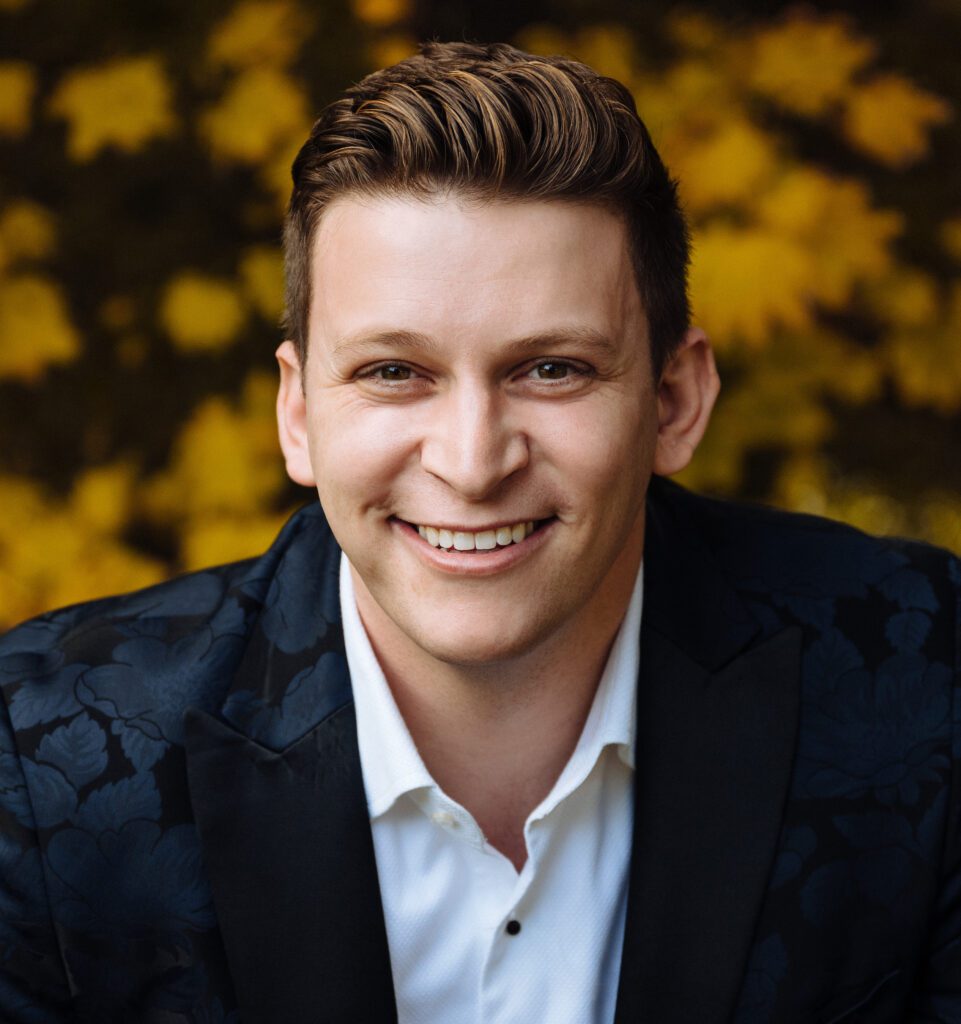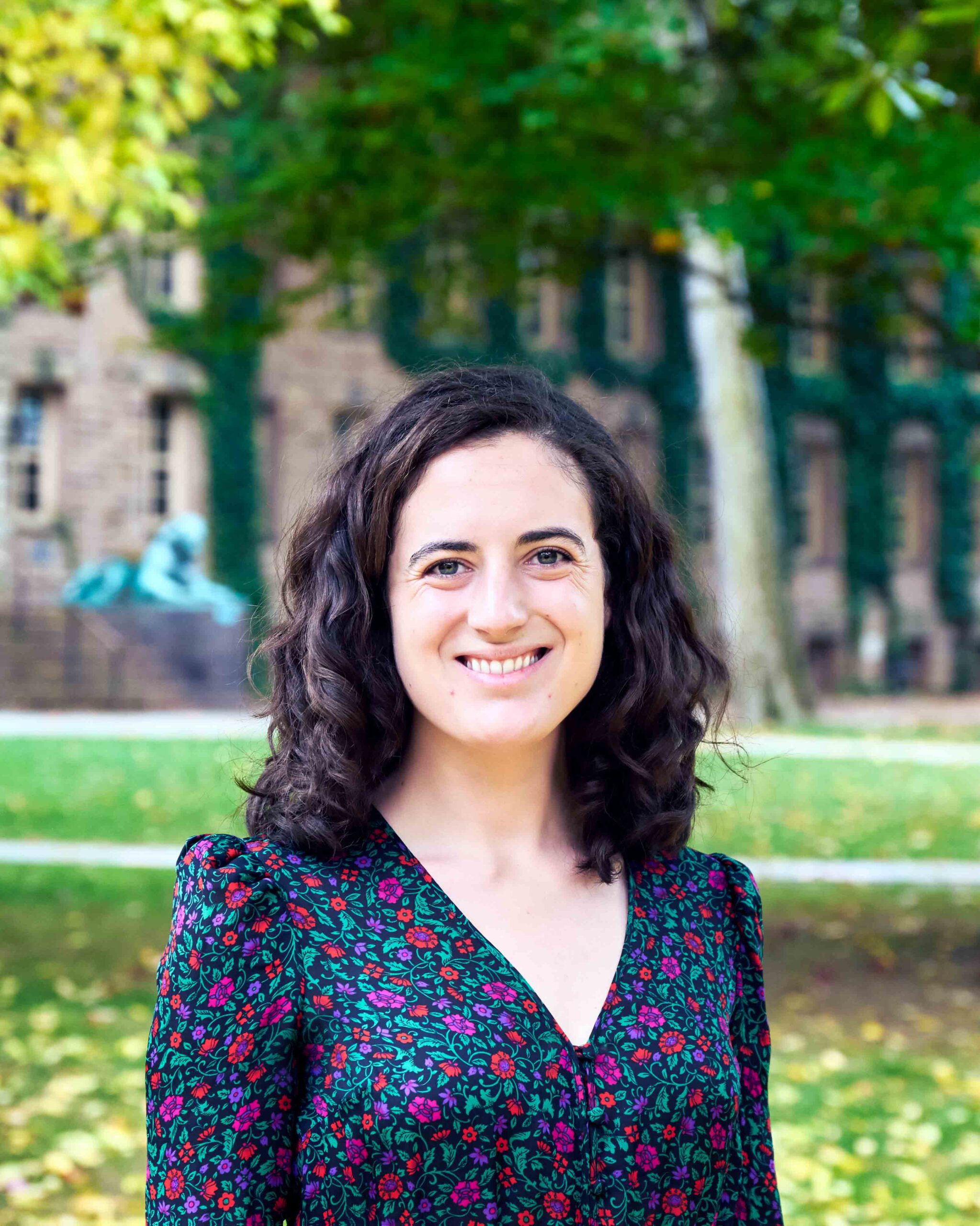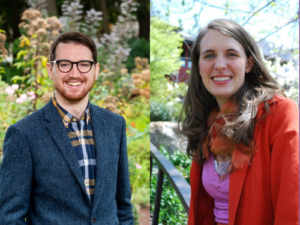The Princeton University Department of Music is proud to congratulate graduate student Sophie Brady, who has been awarded the Paul A. Pisk Prize for her paper “From the Living Room to the Concert Hall: Francis Bebey’s Experimental Collaborations.”
Established in 1991 by the American Musicological Society, the Pisk Prize recognizes “the most outstanding scholarly paper read at an Annual Meeting of the Society by a graduate music student.” In recent years, the cohort of awardees have presented on topics as wide-reaching as the politics of timbre in Soviet-era music and the cultural diplomacy of Aaron Copland to the practice of “tuning up” in contemporary gospel performance. Brady’s scholarship now adds to these research avenues an insightful inquiry into experimental music’s hybridity through the retrospective lens of the work of popular Cameroonian-French multi-instrumentalist composer and writer Francis Bebey (1929-2001) and avant-garde composer Pierre Schaeffer (1910-1995).
It would be a misstep to claim a direct link between Brady’s foundational work in her undergraduate years as a music student at Barnard College and this exciting moment in her career. Yet there is a connection to be drawn: as a young student in New York, Brady was influenced by the musical riches of the city – which, at that moment, included a strong predominance of South African musical traditions and culture thanks to a prominent festival that was in town. The music was thrilling – especially the experience of seeing operas that Brady, as a vocalist, knew well, but now was hearing in vernacular translations and with unfamiliar instruments. It was a formative moment in Brady’s scholarly curiosity.
“I’ve always been interested in how music is transformed across cultural contexts, particularly moments of global exchange”
A few years later, now at Princeton, Brady remained curious. Like most grad students, she spent her time reading background materials from a wide swath of research areas and – as is the strength of the graduate student – sitting with the information, mulling it over, waiting for an unexpected realization or connection to reveal itself. It was in this liminal space that Brady encountered the footnote that sparked her inquiry into Schaeffer and Bebey – well, perhaps it would be more accurate to call it an album credit. She was looking at a recording of African music in Kofi Agawu’s course when she noticed one “Pierre Schaeffer” noted as the producer of the recording. “It stood out to me. I thought, hey, that can’t be the same avant-garde French composer Pierre Schaeffer that I learned all about in Gavin Steingo’s Sound Studies class and in Simon Morrison’s course on abstraction. And then I looked him up, and it was actually the same person. So what was he doing producing recordings of African music?”
“Here was this interesting history just lurking beneath the surface.”
Through her discovery of Schaeffer and Bebey’s overlapping stories, Brady became interested in looking at the intersecting histories of experimental music and colonialism. Pierre Schaeffer may have been known for being the avant-garde composer, the champion of musique concrète, but he was also a leading presence in French colonial radio, including the very training school where Francis Bebey, for a time, studied. Yet despite the fact that Bebey utilized many of the same instruments and techniques used by Schaeffer – though to vastly different effect – his music pales in the shadow of scholarly attention afforded to Schaeffer’s work.
“It was this historical moment when the French Empire was breaking up and radio was being decentralized into national networks run by independent countries that led to a lot of musical innovation.”
Brady’s journey has not been without its trials. She began her research in the midst of the early days of the pandemic and had to contend with obstacle after obstacle in arranging her multi-site international research in France, Senegal, and Guinea. Yet she managed the complex logistics “with grace and aplomb” (Steingo).
Speaking just days following the announcement, Brady seemed to still be in disbelief. “It was a little bit surreal” (Brady). To put it bluntly, this is a big deal. Brady’s accomplishment is hugely exciting for the whole Department of Music community, but it’s also not all that surprising: “In the short time that Sophie has been working on her dissertation, she has received fellowships from so many agencies that I have almost lost count: a prestigious year-long grant from the Social Science Research Council, a Chateaubriand Fellowship, a fellowship from the Association for Recorded Sound Collections, and a grant from the West African Research Association. The Pisk prize is only the latest of many feathers in her cap” (Steingo).
So, what does this recognition mean? Well, for one, it has given Brady’s research the platform to influence a paradigm shift in the field of musicology. “It is somewhat alarming to recognize that despite the robust and well-documented ties between mid-twentieth-century European composers and colonial administration, histories of ‘European art music’ remain largely oblivious to the world outside the metropole. A growing movement within musicology and art history seeks to change all of that – and Sophie is at the forefront of that movement” (Steingo).
When asked what the award means to her, Brady was modest, preferring to highlight the benefits to the Department of Music: “I think it’s really great for our program because it shows the kind of research that’s being done on campus. I hope that potential students apply to Princeton because they can see themselves here.”
Congratulations, Sophie!
In Other News

2025 Class Day remarks by key note speaker, Nick DiBerardino ’11
Jun 4, 2025
By: Nick DiBerardino ’11, Provost and Dean of Curtis Institute of Music; Chair of Composition Studies; Director of Curtis New Music Ensemble Hello class of 2025! I’m Nick DiBerardino, class …

2024 Class Day remarks by key note speaker, Molly Bolten ’14
Jun 10, 2024
By Molly Bolten ’14 Good afternoon Princeton Music graduates! Please excuse my hoarse voice—I’ve been shouting over very loud music for the last three days. As Professor Snyder told you, …

Aryeh Nussbaum Cohen ’15 Returns to Princeton for Groundbreaking Performance in Elgar’s “Dream of Gerontius”
Apr 15, 2024
Interview by Chloe Yutong Yang ’26 On April 19-20, 2024, countertenor Aryeh Nussbaum Cohen ’15 will make a triumphant return to his alma mater, Princeton University, for a historic performance …


